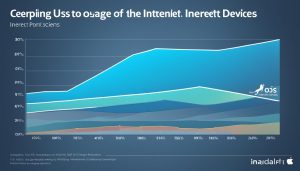Welcome to our blog post on the importance of responsive web design for SEO. In today’s digital landscape, having a responsive website has become essential for businesses of all sizes. A responsive web design ensures that your website looks and functions optimally on all devices, including desktops, tablets, and smartphones.
But what does this have to do with SEO? Well, search engines like Google prioritize user experience when ranking websites. A responsive web design plays a critical role in enhancing user experience, which in turn can boost your SEO rankings.
Imagine a potential customer searching for products or services on their smartphone. If your website is not responsive, they may encounter issues such as distorted images, unreadable text, and difficult navigation. These problems can lead to a high bounce rate and a negative user experience, ultimately affecting your search engine rankings.
On the other hand, a responsive website adapts seamlessly to any screen size, providing users with a consistent and user-friendly experience. By investing in responsive web design, you can ensure that your website engages visitors, encouraging them to stay longer, explore your content, and take action.
In the next sections, we will delve deeper into the benefits of responsive web design for SEO. We will discuss how it enhances user experience and boosts SEO rankings and performance. So, let’s get started and discover why responsive web design is essential for your SEO strategy.
Enhancing User Experience with Responsive Web Design
In today’s digital landscape, providing an exceptional user experience is not just a nice-to-have feature, but a crucial aspect of website success. This is where responsive web design comes into play. By adopting a responsive design approach, websites can cater to the needs of users across various devices and screen sizes, resulting in an enhanced user experience.
One of the key benefits of responsive web design is its mobile-friendliness. With the increasing popularity of mobile devices, having a website that adapts seamlessly to different screen sizes is essential. A mobile-friendly design ensures that users can easily navigate, read content, and interact with your website from their smartphones or tablets.
With a responsive website, you can significantly improve user engagement. Users are more likely to stay longer on a website that is easy to navigate and visually appealing on their chosen device. Responsive web design enables the presentation of content in an optimal manner, making it easier for users to consume information and engage with your brand.
Responsive web design enables the presentation of content in an optimal manner, making it easier for users to consume information and engage with your brand.
Furthermore, responsive web design reduces bounce rates. When users visit a website that is not mobile-friendly, they often struggle to navigate and access the information they need. This frustration can lead to users leaving the website prematurely, resulting in high bounce rates. By implementing responsive design principles, you can create a seamless and intuitive browsing experience that encourages users to explore your website further.
Another significant benefit of responsive web design is its positive impact on conversion rates. When users have a positive experience on your website, they are more likely to convert into leads or customers. A responsive website with clear calls-to-action and user-friendly forms can streamline the conversion process and drive higher conversion rates for your business.
Fast-loading Web Pages and Easy Navigation
Alongside mobile-friendliness, fast-loading web pages and easy navigation are vital components of a superior user experience. Studies have shown that users expect websites to load quickly, and any delays can result in frustration and abandonment.
Responsive web design ensures that your website loads quickly across all devices by optimizing performance. When your website is designed responsively, unnecessary code and elements are minimized, resulting in faster load times. This not only improves the user experience but also positively impacts your website’s SEO rankings.
Additionally, responsive web design promotes easy navigation by providing intuitive menus, clear labels, and well-organized content. When users can find the information they need quickly and easily, they are more likely to engage with your website and achieve their goals, whether it’s making a purchase, submitting a contact form, or accessing valuable resources.

In conclusion, responsive web design plays a crucial role in enhancing user experience. By creating a mobile-friendly, fast-loading, and easily navigable website, you can improve user engagement, reduce bounce rates, and boost conversion rates. Investing in responsive web design is not only beneficial for your users but also contributes to improved SEO performance, as search engines prioritize user-friendly websites. Prioritize user experience and leverage the power of responsive web design to drive success in the digital landscape.
Boosting SEO Rankings and Performance with Responsive Design
Responsive web design is more than just a trendy buzzword—it’s a crucial factor in boosting your website’s SEO rankings and overall performance. Search engines like Google prioritize mobile-friendly websites, and having a responsive design ensures that your site is optimized for all devices, including smartphones and tablets.
One of the main benefits of responsive web design for SEO is improved page load speed. Websites that load quickly on mobile devices not only provide a better user experience but also receive a ranking boost from search engines. With responsive design, you can optimize your site’s performance by reducing the file size and utilizing efficient coding techniques.
Furthermore, responsive web design simplifies website management, making it easier to maintain and update your site. Instead of maintaining separate desktop and mobile versions, a responsive design allows you to have a single website that automatically adjusts to fit each user’s screen size. This streamlined approach saves time, resources, and eliminates the potential for duplicate content issues.
In addition to enhancing SEO rankings, responsive web design also has a positive impact on local SEO and social sharing. A mobile-friendly site is more likely to attract local customers who are searching for products or services nearby. Moreover, when users have a seamless experience on your responsive website, they are more inclined to share your content on social media platforms, increasing your online visibility and driving organic traffic.




